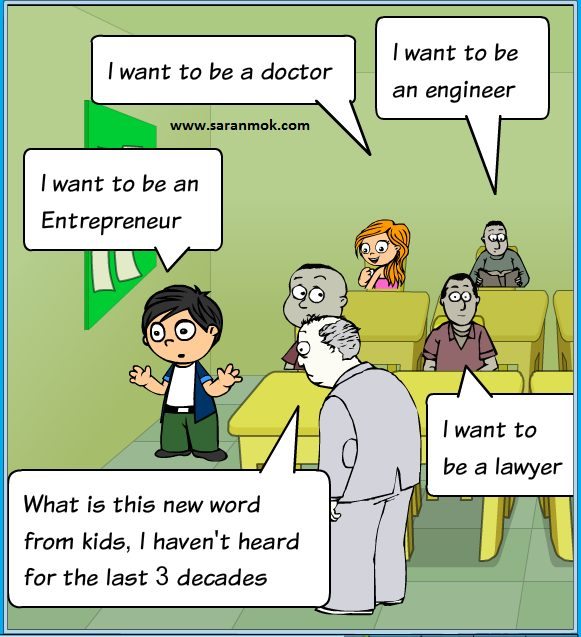
Starting up is setting up something from scratch. In English language, it is a verb. In life, it is an action. Over a period of time it turns as noun called ‘startup’ but it has numerous actions involved with it. Before getting into the topic one should understand the difference between startup and business, entrepreneur and merchant.
For instance, let us take KFC as a startup and investing in KFC’s franchise is a business. Perhaps, a business generates money from the day one but a startup will not generate money from the day one. A business can promise certain income but a startup can not promise certain income. A plan can be prepared and executed in a business but preparing a plan is a continues activity in the startup. We are writing the bible from reality in a startup but following the bible in the business.
Well, writing a bible is not writing notes, it is writing basics to obey, writing formulas to apply, writing methodologies to follow, creating processes to implement. Eventually, it is not a routine task, it is not a normal activity, it is not a regular task to work. Hence it is proved that start up needs abnormal and extraordinary efforts & patience from a determined individual.
Readiness (Mentally and physically)
So, the take away is: Mentally and physically getting ready is the first step for a startup. Yes, the entrepreneur should get ready to live with lot of uncertainty, the entrepreneur should get ready to travel alone, the entrepreneur should be ready to control emotions, the entrepreneurs should get ready to keep investing time and efforts until see the success, the entrepreneur should get ready to deal the financial issues, the entrepreneur should get ready to deal the discouragement and insults, the entrepreneur should understand the true meaning of dignity of labor, the entrepreneur should get ready to deal the competition, the entrepreneur should transform as a real leader. The readiness as a real entrepreneur is the first stage of a startup life cycle — First basic of a startup.
Here is the startup life cycle.

Self Analysis (WWH)
What? Why? How? analysis should be done before getting into next phase of the life cycle. Outcome of the self analysis gets clarity and set the direction. So, first thing is first, develop an entrepreneur mindset.
What? (Self talk)
What am I solving? Is it an existing problem? How many people are getting impacted because of the problem? Why should I solve this problem? What is the qualifications and awareness I have? How can I gain more knowledge on the problem? Would the solution turn as unique or compete with another business? — The outcome of ‘What’ analysis is getting more clarity on what am I solving and the impact of the solution.
Why? (Self talk)
Why am I starting up? What do I need? Is it passion? Is it for money? Is it for social status? Creating employment? Want to do social service? This internal agenda drives entrepreneur’s mindset, the mindset triggers actions, actions generate the results. In any of the above cases the dynamics of the startup works the same. It won’t change the behavior per entrepreneur’s agenda. Startup expects to learn, expects to get hurt, it expects to understand the problems involved in establishing a company, it expects to go down, it expects to understand the worth of customer’s money, it expects to understand the commercialization, it expects to understand the value of relationships, it expects to understand the value of money, it expects to understand the society — So, get ready to learn before success. Otherwise an entrepreneur can not handle success, it remains as one day celebration.
These are the minimum lessons learnt to be a successful entrepreneur. Eventually, the startup agenda will be prioritized by nature regardless of entrepreneur’s agenda. So, get ready to be smart enough to take the prioritization into your hands. That is why the reality is
The real and successful first generation entrepreneur is practical not arrogant because he/she went through a painful journey.
Narasimha Mohan
How (Self Talk)
How to do is an approach? A process can be defined from a successful approach, success can be achieved by choosing a right approach, experience teaches the right approach. Then how to define a right approach without experience? Chances are less because every start up is different by its nature, every business is different by its execution. The best way to have a right approach is altering it, based on the results parallelly. Am I executing it alone? Do I need cofounders? Am I investing from my pocket? Am I borrowing money? An entrepreneur should ask himself numerous questions to finalize the approach.
Hint: Understand your mindset, attitude meticulously and master it, to pick a right approach.
Problem solving is a product building. So, 75% of the start up life cycle is product life cycle. From the phase “Research and planning” will be explained in part-2.
Another good read:

He is the Author, Product Specialist, Business Consultant, Entrepreneur, Public Speaker, Thought provoking writer, and Joke writer. Follow him on Twitter



Leave a Reply